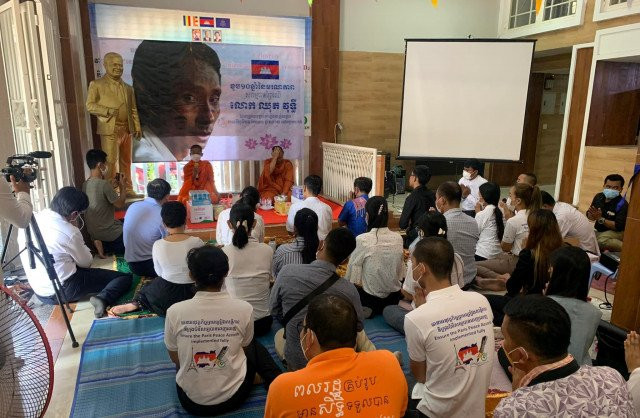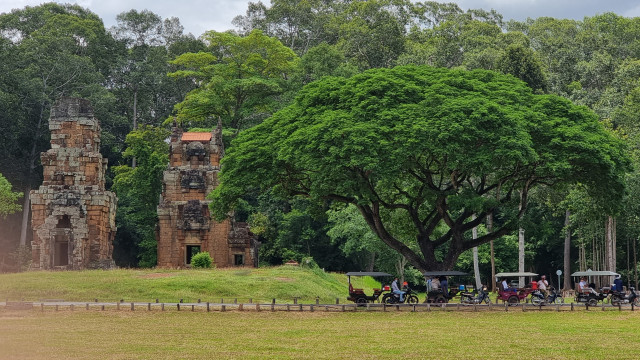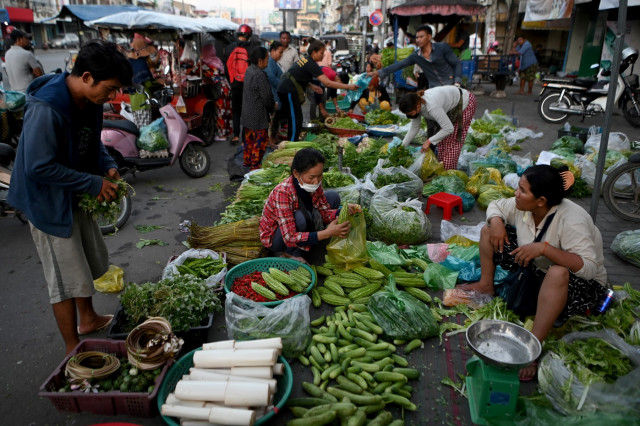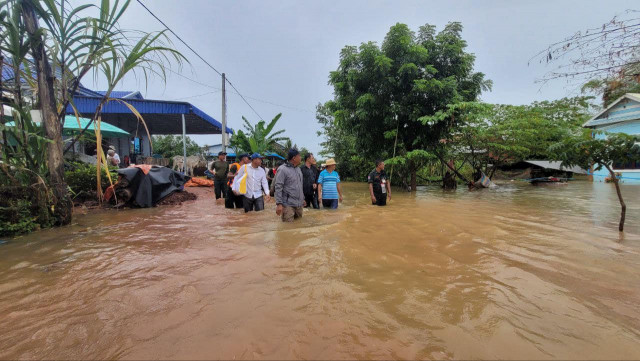10 Years On: Still No Justice for Wutty’s Death, “Unless Change Happens”

- By Teng Yalirozy
- April 26, 2022 11:52 AM
Rights defenders and activists hold a ceremony on April 25 to commemorate Wutty’s memory and legacy
PHNOM PENH – True justice for Chut Wutty, a prominent environmental activist assassinated 10 years ago, will not exist in Cambodia, unless there is a change in the current political regime and a new reform in the country’s judiciary, says Cheuy Oudorm Reaksmey, a son of Wutty.
“I don’t have faith in the Cambodian government and Koh Kong provincial court in giving true justice to my father,” said Reaksmey.
He added that the country’s judiciary is not independent while the Cambodian government never shows support for activists, but instead arrests many of them.
“So, I think it’s hard to bring justice to my father as timber traders are the powerful people in the government,” Reaksmey said.
Chut Wutty was in his mid-40s when he was killed, on April 26, 2012, while investigating illegal logging in the Cardamom Mountains at Veal Bei Point in Mondol Seima District, Koh Kong Province. He was accompanied by two female journalists from The Cambodia Daily, who were close-by, but not directly present at the crime scene, when he was shot dead. After hearing gunshots, they found Wutty’s body in his car. A 32-year-old military officer, In Rattana, was also found dead at the scene.
Ran Boroth, a private security guard at the Timber Green logging company who was accompanied by military police when detaining Wutty, was sentenced to two years in prison for Chut Wutty's death.
Cheuy Oudorm Reaksmey, however, said his family never accepted the judgment of the Koh Kong Provincial Court, accusing the authorities of protecting the company while private firms are not supposed to be protected by armed guards in Cambodia.
“What we want is not the 2-year imprisonment of the company’s security guard,” he said. “We want the Koh Kong court to further investigate the case and find the person who was behind and organized this murder.”
Reaksmey said after the death of his father, who was the breadwinner of the family, his life completely changed as every responsibility fell upon him. He was only 19 years old at that time. He said he had to find a job to put food on the table, pay school fees for his younger siblings, and to cover his mother’s illness treatment expenses.
Following the murder of Chut Wutty, Reaksmey, civil society groups, and those who respect the activist, have done countless campaigns demanding justice, patrolling the community forest, and advocating for the closure of timber companies across Cambodia, but to no avail.
“They [the relevant ministry] never paid attention to our petition,” he said. “I think the government has never had the willingness to protect the forest in Cambodia.”
According to a Ministry of Environment report issued in 2021, Cambodia has so far maintained 46.86 percent–which amounts to 8.5 million hectares–of forest cover across the country, down from 61.75 percent in 2002.
Of these 46.86 percent, 41 percent are under the responsibility of the Ministry of Environment, which guarantees their protection and conservation, according to the report.
Body gone but legacy remains
During his many years of environmental activism, Chut Wutty had received numerous death threats, had been arrested, physically beaten, and had even received threats that his children would be kidnapped. Nonetheless, he persisted, until the bitter end.
Chut Wutty, who was born in the early 1970s in Kandal Province and studied in Russia, previously worked for the Ministry of National Defense before leaving in 2000 to work for Global Witness, an environmental and transparency watchdog that has tracked the illegal timber trade in Cambodia and linked it to a number of high-ranking and powerful individuals.
In 2002, the director of Global Witness was dragged from her car and attacked on the streets of Phnom Penh, and the organization was barred from entering Cambodia in 2005.
The Prey Lang Community Network (PLCN) was created by the work of Wutty and has been working to protect the Prey Lang Forest since Wutty’s death. The PLCN is now frequently clashing with the government over access to the protected forest.
On April 25, civil society groups and Wutty’s family held a ceremony commemorating the 10th anniversary of his death.
Ul Vann, president of the Cambodian Youth Network (CYN), said the ceremony was dedicated to Chut Wutty’s memory and to pledge continuing the right’s defenders’ actions in demanding true justice from the Cambodian government through the Ministry of Justice and the court.
“The investigation was not comprehensive and was done in a rush. We want the government to conduct a further and thorough investigation and find the real murderer,” he said, adding that doing so is to show the responsibility and the effort in promoting of rule of law and averting impunity in Cambodia.
Vann went on to say that Wutty was a prominent environmental activist in Cambodia who was willing to sacrifice his time and life to protect the forest and ecosystem. Wutty’s personal commitment, thus, perfectly serves as a good model for the Cambodian youth and the public to have the willingness to dedicate their time and personal resources to protect the ecosystem, which is a crucial element for Cambodia.
“We still remember his heroic action and want to continue his mission in protecting the natural resources and forest in Cambodia,” said Vann.
Chak Sopheap, Executive Director of the Cambodian Center for Human Rights (CCHR), said that true justice has not been granted as many aspects of the case remain unclear, even after the initial investigation. It was a suspicion, she said at the commemoration ceremony for Wutty.
“Providing justice to citizens is crucial, yet we rarely see active intervention from the government for journalists or unions who have been harassed, and for the killed activists,” she said.
This is the continuation of impunity culture in Cambodia, which affects the good governance of the country, Sopheap added.
The government wants to change the justice system in Cambodia but it cannot be done if cases like Chut Wutty, Kem Ley–a Cambodian political commentator who was murdered in 2016–, and Chea Vichea–a human rights defender and President of Cambodia's Free Trade Union of Workers who was assassinated in 2004–, keep happening in the country, Sopheap said.
“I appreciate other activists, like in the PLCN, who continue Wutty’s mission despite the restriction imposed on them,” she said. “I encourage them to continue, especially the young activists who were arrested due to their activism.”
Ul Vann of CYN said that justice is there for everyone as long as the government takes a clear, responsible, and honest approach not only on Wutty’s case but cases of the other activists. Vann pledged that he and the other civil society groups will keep working and demanding justice for social, human rights, and environmental activists to help promote the respect for the Rule of Law in Cambodia.
The human rights situation in the Kingdom of Cambodia worsened throughout 2021. To silence civil society, human rights defenders, trade unionists, journalists, and political opponents, a variety of repressive tactics were increasingly used.
The World Justice Project's Rule of Law Index 2021, which measures rule of law adherence around the world, ranked Cambodia 138th out of 139 countries, a decrease from the previous year's ranking of 127th out of 128 countries.















